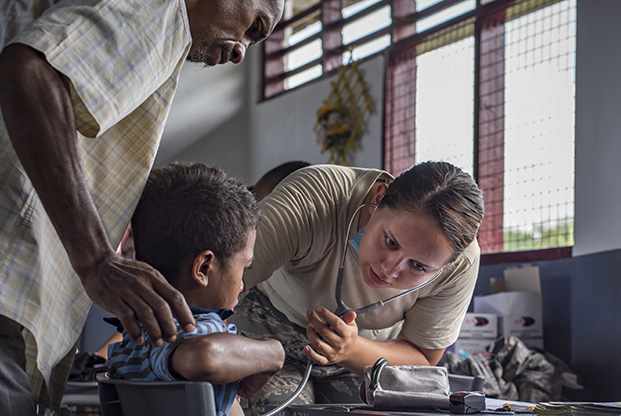
SrA. Hannah Zink, right, during a health service outreach in southwest Timor-Leste on June 11. PAC ANGEL, a humanitarian assistance operation, also improves military-to-military partnerships in the Pacific. Photo: TSgt. Benjamin Stratton
FIGHT FOR YOUR RIGHT TO PILOT
Twenty-two new Afghan Air Force pilots graduated from Initial Entry Fixed-Wing school in the Czech Republic in June—including two female pilots, the Air Force announced. Officials with Operation Resolute Support have been working to recruit more women into the Afghan National Army, and, to that end, have placed gender integration advisors in the Train, Advise, and Assist Commands, the Air Force said.
One of the female graduates, Afghan Air Force 2nd Lt. Omari, said in a release that she and the other woman had “no experience driving cars or motorcycles,” so flying was “kind of unnerving.”
However, she said, “As we got used to it, it became easy.”
Omari added that it was “unbelievable” to get her wings, after a lifetime of wishing to be a pilot.
The other woman in the class, 2nd Lt. Salahshor, said she hoped she and Omari can be an inspiration for others.
“I just want to say, not only to girls in Afghanistan, but to girls all over the world, that whatever challenges you might face, it doesn’t matter. … Keep going, you should fight for your rights and you should follow your dreams,” Salahshor said.
MORE RESOLUTE EVERY DAY
The pilot graduation came as the deputy air commander for the Resolute Support mission praised the Afghan Air Force’s improving capabilities and proficiency. USAF Brig. Gen. Lance R. Bunch, vice commander of the 9th Air and Space Expeditionary Task Force in Kabul, told reporters via teleconference that the Afghan Air Force has begun dropping laser-guided bombs and integrating the UH-60 helicopter into operations and has also conducted combat air drops.
The force “gets better every day,” Bunch said, and the “capability gap between the Afghan government forces and the Taliban continues to grow.”
CHECK OFF THAT CHECKLIST
Also in June, Air Forces Central Command started the second phase of a push to make the predeployment checklist a lot shorter for airmen heading to the AFCENT area of responsibility. The first phase started in March, when reporting instructions were cut from 23 pages down to nine, according to an Air Force news release.
The second phase shrinks the to-do list for predeployment airmen even more, reduces the amount of time airmen need to spend doing computer-based training, and cuts down on country-specific reporting instructions, USAF announced.
None of the changes are “dramatically different,” explained Col. Devin Statham, AFCENT’s director of manpower, personnel, and services. “We are just doubling down on our efforts, giving more time back, reducing guidance, and empowering commanders to make decisions,” he said.
PACIFIC ANGELS
In the Pacific, a team of USAF doctors and dentists helped nearly 5,500 patients over the course of six days in Timor-Leste, Asia, while civil engineers completed seven projects at two schools and a hospital, all part of Pacific Angel 18-1.
The goal of PAC ANGEL is to build partnerships and increase humanitarian assistance and disaster relief capabilities. Kathleen Fitzpatrick, US ambassador to Timor-Leste, said the work on the facilities alone will “improve the quality of education and health” for more than 65,000 people, according to an Air Force news release.
In addition to treating patients, the American doctors also worked with local hospital staff to share information and techniques.
Nazario Dos Santos, general medicine director of the hospital the team worked with, said his team will use the information they learned from the USAF team to treat patients.
“PAC ANGEL saves lives,” Dos Santos said.
MSgt. Damon Weigl, expeditionary engineer section chief with the 18th Civil Engineer Squadron, based at Kadena AB, Japan, said in the release the true impact of the exercise is “not about how much medicine has been handed out or construction projects completed, it’s about the lasting personal connections we make with our multilateral partners.”
MSgt. Justin Haggerty, the PAC ANGEL 18-1 antiterrorism officer, from the Kadena-based 18th Security Forces Squadron, said the effect is “immeasurable.”
“We’re able to come in and help people [who] have never had access to medical care in their entire lives, or very limited access, and bring advanced medical care, … treatment, and equipment here for the Timorese,” Haggerty said.
The Timor-Leste engagement was the first of four PAC ANGEL humanitarian assistance engagements scheduled for 2018. The three others will be in Vietnam, Vanuatu, and Sri Lanka.